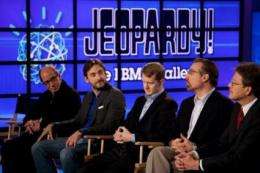Computer creams human 'Jeopardy!' champs

An IBM computer creamed two human champions on the popular US television game show "Jeopardy!" Wednesday in a triumph of artificial intelligence.
"I for one welcome our new computer overlords," contestant Ken Jennings -- who holds the "Jeopardy!" record of 74 straight wins -- cheekily wrote on his answer screen at the conclusion of the much-hyped three-day showdown.
"Watson" -- named after Thomas Watson, the founder of the US technology giant -- made some funny flubs in the game, but prevailed by beating his human opponents to the buzzer again and again.
The final tally from the two games: Watson at $77,147, Jennings at $24,000 and $21,600 for reigning champion Brad Rutter, who previously won a record $3.25 million on the quiz show.
"Watson is fast, knows a lot of stuff and can really dominate a match," host Alex Trebek said at the opening of Wednesday's match.
Watson, which was not connected to the Internet, played the game by crunching through multiple algorithms at dizzying speed and attaching a percentage score to what it believed was the correct response.
"Jeopardy!", which first aired on US television in 1964, tests a player's knowledge in a range of categories, from geography to politics to history to sports and entertainment.
In a twist on traditional game play, contestants are provided with clues and need to supply the questions.
The complex language of the brain-teasers meant Watson didn't merely need to have access to a vast database of information, it also had to understand what the clue meant.
One impressive display came when Watson answered "What is United Airlines" to the clue "Nearly 10 million YouTubers saw Dave Carrol's clip called this 'friendly skies' airline 'breaks guitars.'"
But a Final Jeopardy flub on Tuesday's show prompted one IBM engineer to wear a Toronto Blue Jays jacket to the final day of taping and Trebek to joke that he had learned the Canadian metropolis was a US city.
Watson had answered "What is Toronto????" to the question: "Its largest airport is named for a WWII hero. Its second largest, for a WWII battle" under the category "US Cities."
Jennings and Rutter both gave Chicago as the correct answer.
Watson's success was a remarkable achievement and a historic moment for artificial intelligence, said Oren Etzioni, a computer science professor at the University of Washington.
"Jeopardy! is a particularly difficult form of natural language because it's so open-ended and it's so full of puns and quirky questions," he told AFP.
But while Watson was impressive, he's still light years away from the kind of interactive, thinking computers imagined by science fiction, like the murderous Hal in the film "2001: A Space Odyssey."
"The day where robots will keep us as pets is still very far away," Etzioni said.
That's because Watson can't really think for itself or even fully understand the questions, and instead "employs a lot of tricks and special cases to do what it's doing," he said.
The next step is to see how this technology can be used in applications with real economic and social impacts.
Watson, which has been under development at IBM Research labs in New York since 2006, is the latest machine developed by IBM to challenge mankind.
In 1997, an IBM computer named "Deep Blue" defeated world chess champion Garry Kasparov in a closely-watched, six-game match.
Like Deep Blue, Watson "represents a major leap in the capacity of information technology systems to identify patterns, gain critical insight and enhance decision making," IBM chairman Sam Palmisano said in a promotional video.
"We expect the science underlying Watson to elevate computer intelligence, take human to computer communication to new levels and to help extend the power of advanced analysts to make sense of vast quantities of structured and unstructured data."
IBM already has plans to apply the technology to help doctors track patients and stay up to date on rapidly evolving medical research.
(c) 2011 AFP



















